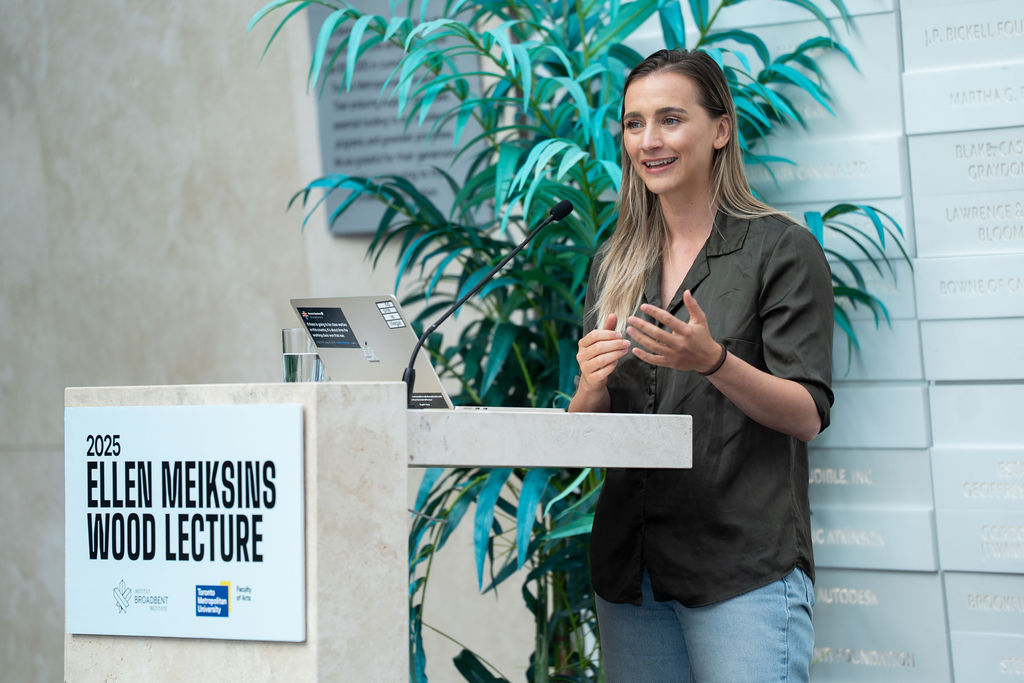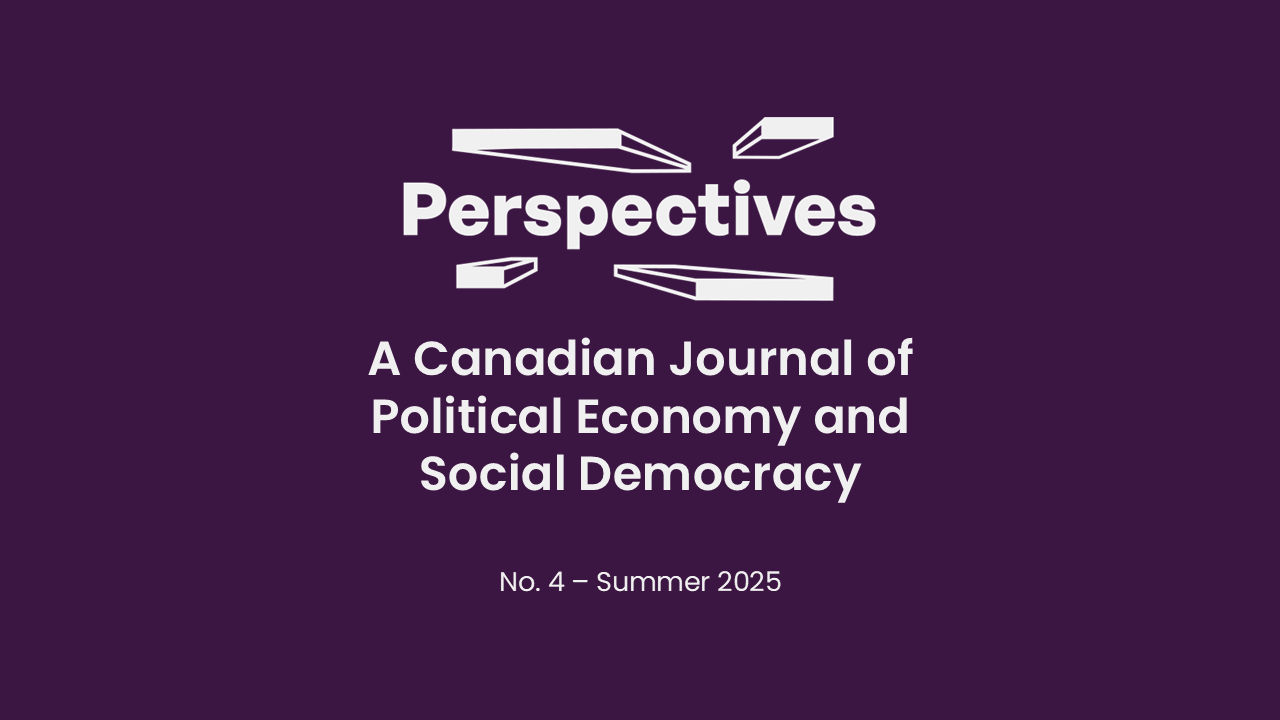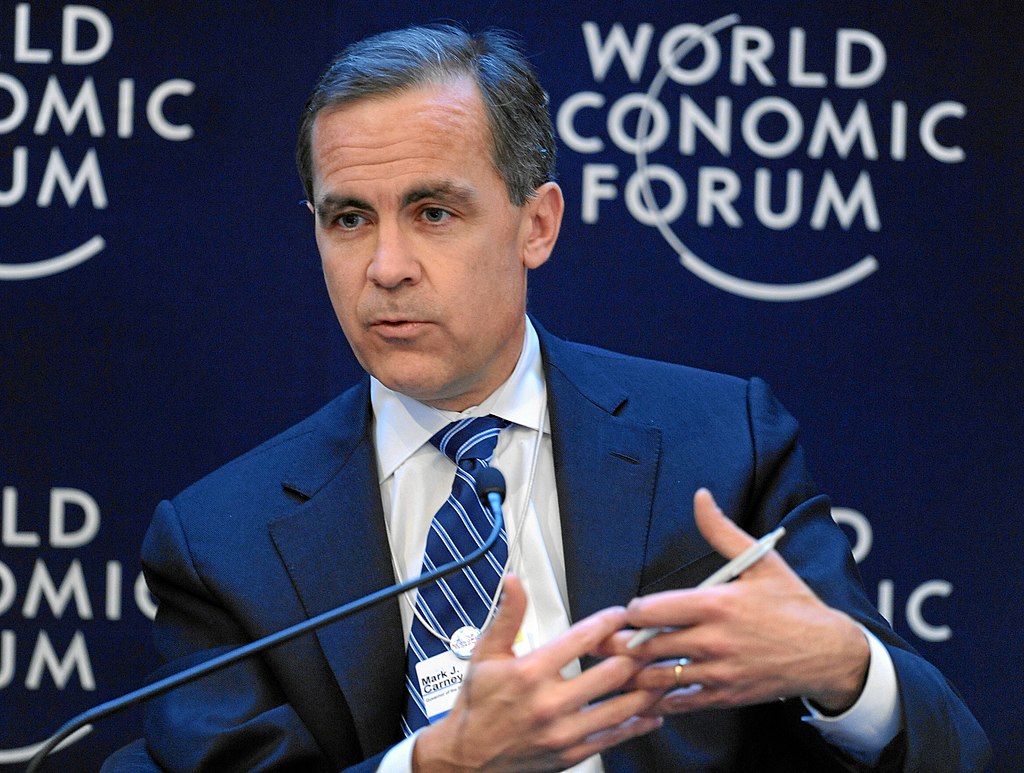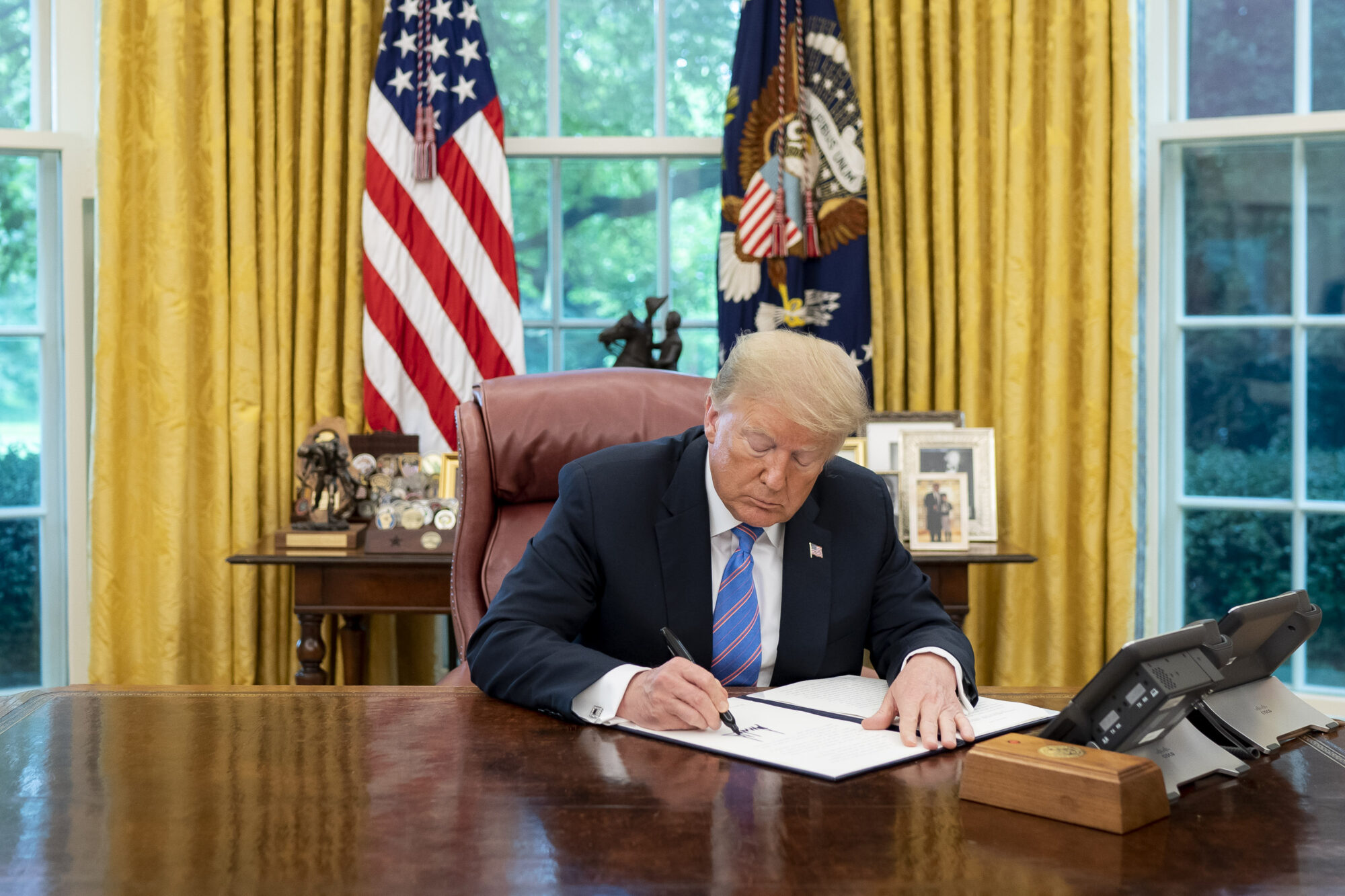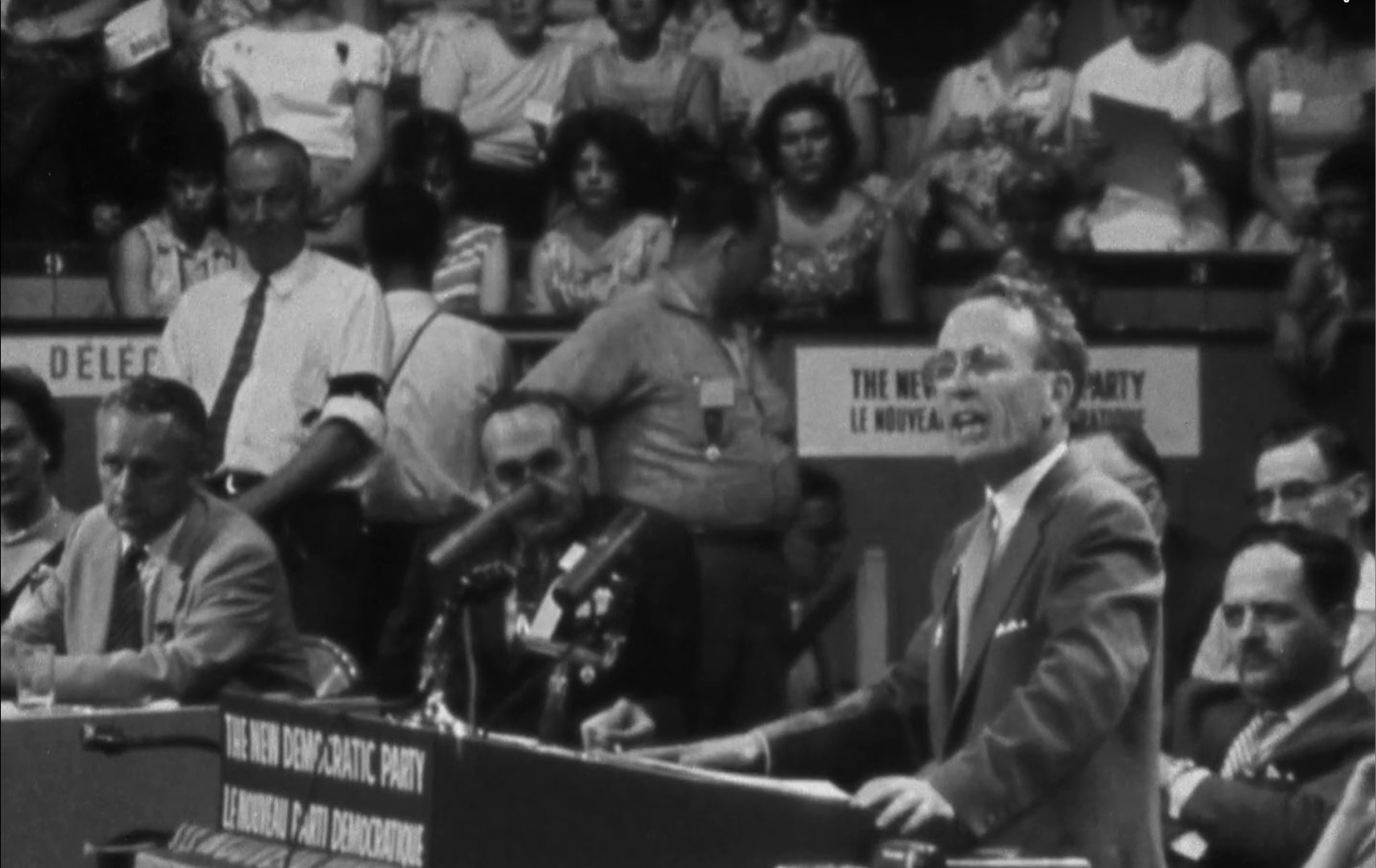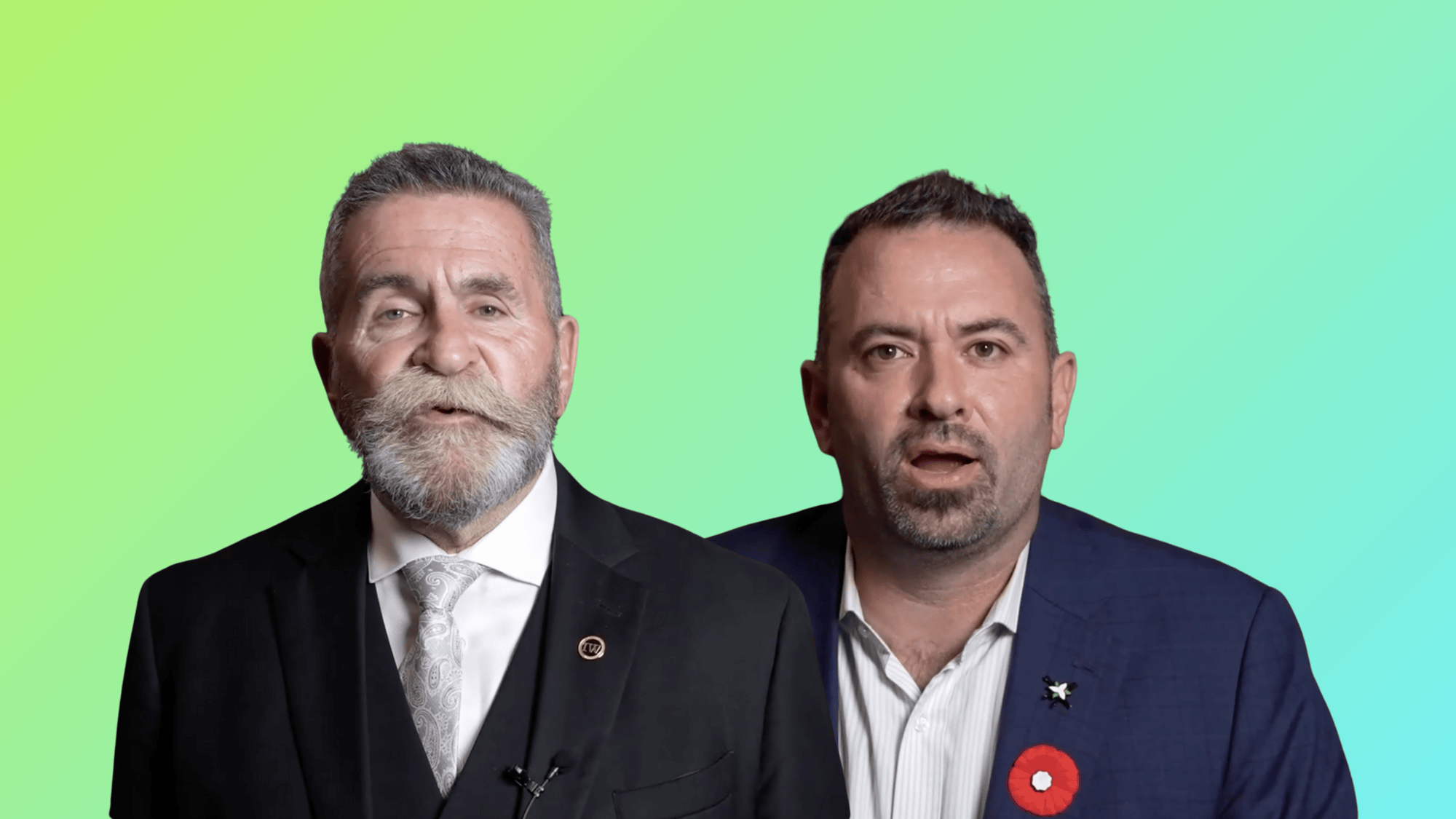The 2025 Ellen Meiksins Wood Lecture was held on Tuesday, May 20th in partnership with Toronto Metropolitan University’s Faculty of Arts. A special thanks to TMU Interim Dean of Arts Amy Peng for hosting this Broadbent Institute event.
Ellen Meiksins Wood was one of the left’s foremost theorists on democracy and history, and often promoted the idea that democracy always has to be fought for and secured from below, never benevolently conferred from above. The Institute founded the annual Ellen Meiksins Wood Prize & Lecture to honour Professor Wood’s legacy as an internationally renowned scholar and to bring her work to new generations of Canadians.
The Ellen Meiksins Wood Prize is given annually to an academic, labour activist or writer and recognizes outstanding contributions in political theory, social or economic history, human rights, or sociology.
Each year’s recipient also delivers the Ellen Meiksins Wood Lecture.
The 2025 Ellen Meiksins Wood Lecture was delivered by economics and politics commentator Grace Blakeley. She is awarded the 2025 Prize in recognition of her critical analysis of economic systems and neoliberal capitalism that helps movements take back democratic power for the working-class.
Listen to the full lecture on the Perspectives Journal podcast, available to subscribe on Spotify, Apple Podcasts, YouTube Podcasts, Amazon Music, and all other major podcast platforms.
2025 Ellen Meiksins Wood Lecture
This lecture has been edited for clarity.
It is so great to be here with you today in Toronto, and it is such a huge honour to be awarded the Ellen Meiksins Wood Prize.
Ellen’s work has had a huge impact on me. I would place my writing in the tradition of political Marxism, which is the school that Ellen helped to found. And in particular, her understanding of the relationship between capitalism, class, and democracy have deeply informed my thinking and my latest book, Vulture Capitalism. In fact, I quote Ellen’s work at length in the introduction to that book.
I think Ellen’s understanding of democracy, which was a rigorously materialist understanding of democracy. Thinking about the very first emergence of democratic institutions in Athens, she insisted that it needed to be understood from a materialist perspective: we needed to be able to understand the relations of production, to be able to figure out what this Athenian system meant—and this perspective is needed all the way through to her analysis of the Industrial Revolution and the emergence of capitalism. She understood this as a historically specific social formation, not an inevitability, which helps our understanding of modern politics and the kind of crisis of democracy today.
These insights have not only informed my thinking. I think they are incredibly important in understanding what we are experiencing today, which is a profound crisis of democratic institutions all across the rich world.
The most obvious case of this crisis is, of course, what we’re seeing just south of Canada in the US – but we are seeing this crisis of democracy happening all over the world. Particularly, when we look at Europe, due to the rise of the far right, which uses explicitly anti-democratic rhetoric, which is appealing to an increasing section of the electorate. Democracy is actually losing support across the board, particularly among young people, many of whom are likely to say that they don’t believe that democracy works.

So what’s gone wrong? There was a time when liberal democracy seemed hegemonic, unchallengeable. Liberals were overjoyed at the alleged “End of History” in the 1990s. This was a moment of euphoria when history was literally seen as over. History is understood, in the liberal imaginary, as a great battle between ideas—obviously very different to the Marxist understanding of history as a battle between different classes. The 1990s meant that history was over. Capitalism had won. Capitalism and this specific form of liberal representative democracy were seen as bedfellows, and this was where the rest of the world was going.
Then, all of a sudden, something changed. Support for democratic institutions, and actually most social institutions, started to ebb after the Financial Crisis of 2008. Liberals didn’t really have a convincing explanation as to why this happened. The most common thing I hear, when I’m talking to someone in the liberal tradition as to why we’ve seen this corrosion of support for democracy, is to blame social media; the idea being that people are being brainwashed to dislike democracy.
I think Ellen Meiksins Wood would disagree. I think she would have something to say about that, because her work focused on explaining how democratic institutions emerge from a materialist perspective: by analyzing the relations of production and how productive forces shape what is going on throughout the rest of society.
We need that perspective now more than ever to understand why democracy is under threat. And part of the issue here is, of course, that we don’t have real democracy. This is a big part of my argument in Vulture Capitalism; a book that argues that capitalist societies are characterized by a form of oligarchic centralized planning in which public and private institutions work together to plan who gets what.
You can see that in the centralized planning that takes place within large monopolistic corporations, but also in the way powerful states work alongside those corporations to consolidate wealth and power for those at the top. This is completely contradictory to the way that Ellen Meiksins Wood understood democracy; democracy as direct popular power. Democracy as a powerful force that can be used against capitalism, rather than this limited liberal, representative democracy which too often acts as its servant.
In this lecture, I want to discuss the crisis of liberal democracy, how we might build what Ellen Meiksins Wood would have seen as a genuine democracy, and all the challenges associated with that in this age of hyper-individualism.
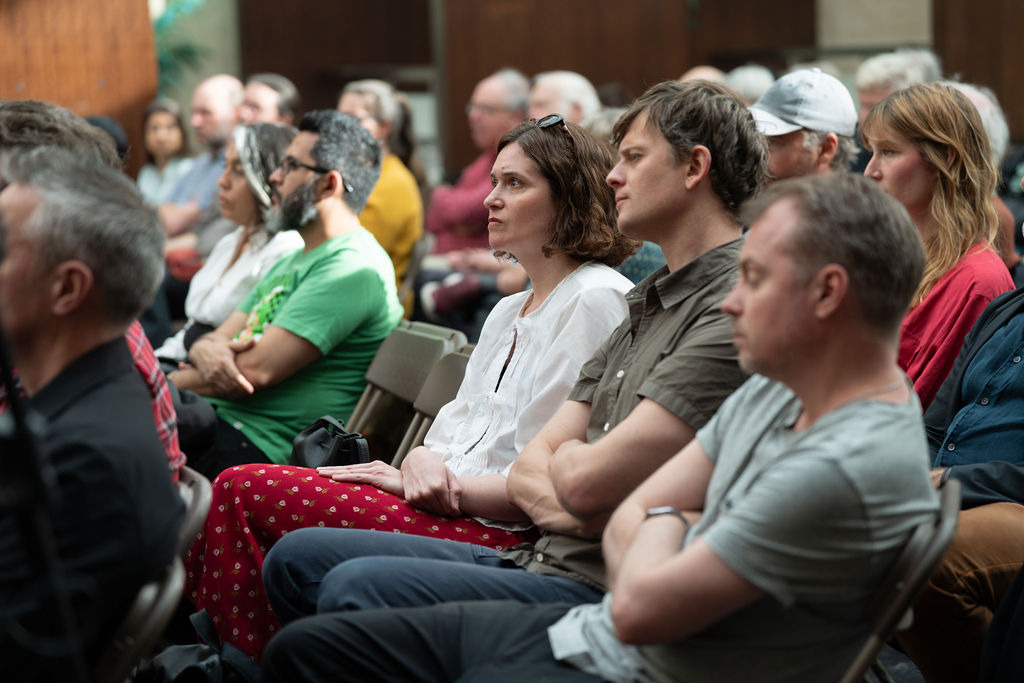
So, how can we understand the current crisis of democracy from a materialist perspective?
The first and most obvious candidate is, of course, inequality. In the UK there was a study that came out showing that the country’s 50 richest families hold more wealth than 50 percent of the population. This is contrary to the narrative that we have in the UK, that inequality is stable and it is not much of a problem. This is obviously wrong. In the US, it is similar where the richest 10 percent control 60 percent of the country’s wealth.Meanwhile, poverty is on the rise. In the UK, we have a record 4.5 million children living in poverty. Another statistic that came about the US the other day: 60 percent of families are struggling to afford the essentials.
The reason these trends are threatening democracy is that wealth and political power are fungible, because, as Ellen Meiksins Wood would have reminded us, there is no real separation between the economic and the political under capitalism.
This is a crucial point to be able to understand the political Marxist critique of liberal democracy; that we don’t live in free market democratic societies. Instead, we live in systems of centralized capitalist planning where large corporations and powerful states work together to plan who gets what.
What defines capitalism is not free market democracy, but a divide between the people who own all the stuff and everyone else who is forced to work for a living, as well as the organization of society in the interests of the former.
When my book first came out, this was a more controversial point to make. Today, it seems obvious when you have Elon Musk and Donald Trump working together to plan the US empire. But it’s not new. This is always the way that capitalism has worked; this form of capitalist planning. It has ebbed and flowed in different ways over the years, but has been a constant feature of capitalism since its inception, all the way back to the East India Company which was a joint venture between merchants and the British state in pursuit of imperial power.
In Vulture Capitalism, I give examples of what this looks like today. The book opens with the example of Boeing and the 737 Max disasters that have killed nearly 350 people. It was later revealed that Boeing knew about the problems with these planes before they went to market, allowed them to go to market anyway. I also show the central role of the American state in supporting this company before this crisis, through the crisis, and then after the crisis. I show those intimate links between corporations driven by this pursuit of wealth at all costs, and capitalist states driven by a desire to shore up their own wealth and power, and doing so by cooperating with elites and vested interests.
I also use some Canadian examples in the book. Particularly, there’s a very close relationship, as some of you might know, between one of the world’s largest asset managers, BlackRock, and the Canadian state. Now, you have our former Governor of the Bank of England, Mark Carney, leading this country. These links between the public and private sector, mediated by institutions like central banks, are critical to the way that capitalism functions. It goes against the popular understanding of the divide between left and right, as this divide between markets and states.
This is what Marxists can bring to our politics: a recognition and understanding that these two forces are not at odds. They are, in fact, working together as part of a capitalist state system to consolidate the inequality of power that defines capitalism. What defines capitalism is not free market democracy, but a divide between the people who own all the stuff and everyone else who is forced to work for a living, as well as the organization of society in the interests of the former.
This close cooperation between corporate interests, wealthy individuals, and states shapes how liberal democracy functions. This is a big part of the crisis that we’re dealing with today, but this isn’t the end of the story. As I’ve illustrated, this cooperation has always existed and has always been the case. So, why is it becoming more of an issue now? Why is this crisis of inequality having such a deep and profound impact on our democratic institutions?
First, we’re living through a period of low productivity, combined with a series of economic and political crises where there’s less to go around—more at the top means less for everyone else. This includes the rise of zero sum politics of the kind practiced by Trump—if there’s more for me, that means less for you. That’s the antithesis of the 90’s liberal triumphalist end of history moment of not needing to fiddle around with the balance of power between different classes because we can wait for growth and everything else will follow.
This was what collapsed during the Financial Crisis of 2008. It’s what has collapsed even further during the cost-of-living crisis. You know, inflation being one of those really critical trends that enforces this zero sum mindset of more for you means less for me. Inflation is one of those things that brings out class conflict because “who pays for inflation” has historically been decided on the streets as part of the battle between workers and bosses. The rise of this zero sum politics is undermining the foundations of that liberal democratic moment, which was based on the idea that growth would smooth over that contradiction between workers and bosses.
Second, globalization has meant that inequalities are becoming concentrated in particular places, having an outsized impact on our politics as they can be effectively leveraged to shift political outcomes. We know what this looks like in the rise of the liberal metropolitan elite discourse that divided peripheries from the centres of our countries. For example, it gave rise to Brexit and the idea of people in “left behind communities” giving a bloody nose to the liberal establishment by voting for it. This is something that we’re also seeing in the US, and in many other parts of the world.
The final reason that inequality is creating such a profound crisis for our democratic institutions, and the one that I want to focus on, is that we live in an age of individualism that makes people feel powerless to challenge those at the top.
There’s a story that I want to tell you, something that I experienced a few years ago, that illustrates all of these points.
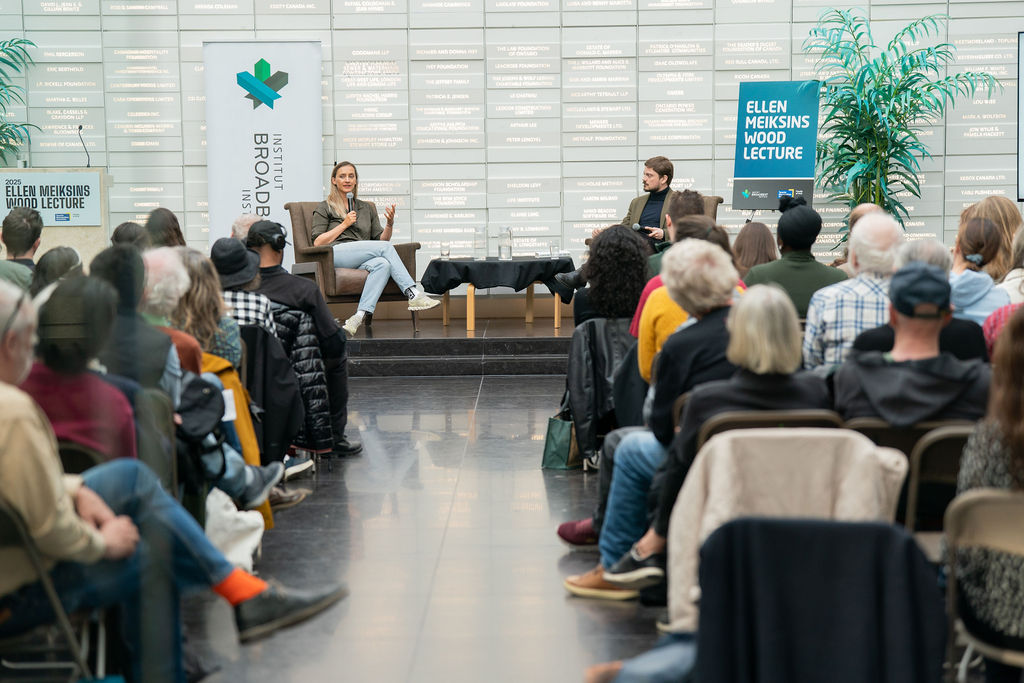
Back in 2019, as some of you may know, I was fairly integrally involved in the UK Labour Party under Jeremy Corbyn. Back in 2019 during the election, I was knocking on doors in these left behind regions of the UK. I was in a former mining town, speaking to voters, asking them how they would be voting. I knocked on one particular door, and the occupant opened it slightly suspiciously. I asked him how he’d be voting in the upcoming election. He said “no,” he didn’t know how he would vote. Many people didn’t make up their minds on voting until the last possible moment in that election. I then asked him, “What are the issues that you are most concerned about?”
He said, “well, I’m particularly concerned about the economy.” So I said, “Great! I’m a policy wonk. I can answer all of your questions about the economic policies in the manifesto.” I then listed these policies and he looks back at me, again very suspiciously. “How are you going to pay for all that?” I then listed all the ways that this was a fully costed manifesto, that there would be taxes on the wealthy, and that there would be investments made that would create growth, et cetera, et cetera. His answer really stuck with me.
He said, “I’ve voted Labour my whole life, and they’ve been in power here for years.” Labour had, in fact, been in local government in that area for years. “They promise the world at election time, and nothing changes.”
I didn’t really know how to respond because the Marxist in me was like, “You’re right. That is a pretty accurate description of how liberal politics works.” We know why this is so from a theoretical perspective. I write all about this in Vulture Capitalism. The capitalist state is, like capital, a social relation, so policy outcomes reflect the balance of class power in society. We’ve seen this clearly with the most recent Labour government to be elected in the UK.
There’s a great example of how vested interests shape the policy process in Rachel Reeves [Chancellor of the Exchequer], who promised to come in and deliver a big tax on private equity. This is a great populist policy. These are some of the wealthiest, most powerful institutions in the finance sector. It would have been a really easy tax, that would have affected a very small number of people.
But, what happened? The private equity industry successfully lobbied to water down these tax proposals beyond recognition. We know how this works and I have written extensively about how this works, but that isn’t really helpful when you’re on the doorstep talking to people about why they should vote for a political party, and why they should get engaged in politics at all.
In an age when people recognize and realize the coordinated, pervasive power of our political economic elites, they feel isolated to do anything about it. […] A message that says, “if you come together, you can be powerful,” is very compelling. The tragedy is that that message, which was historically put forward by the left as part of the labor movement, has been lost.
Afterwards, I thought a lot about this interaction, what this man was feeling, and about what the implications were for our politics. I concluded that all of his responses could be traced back to a profound sense of powerlessness, that nothing could ever change—certainly not in the way that this man wanted things to change. This came through in the question, “how are you going to pay for it?” This was less a question about the intricacies of fiscal policy, and it was more a question about credibility: “why should I believe you, that you can do anything good?” It continues all the way through to the ideas that, “politicians are all the same,” and, “things for people like me don’t tend to change.”
You’ll recognize aspects of this story because it’s an experience that has been replicated all over the developed world, of places being left behind, communities being hollowed out, people feeling powerless to arrest those changes, and the horrifying rise in what some sociologists have called the “deaths of despair;” the suicide and alcoholism that are concentrated in these communities.
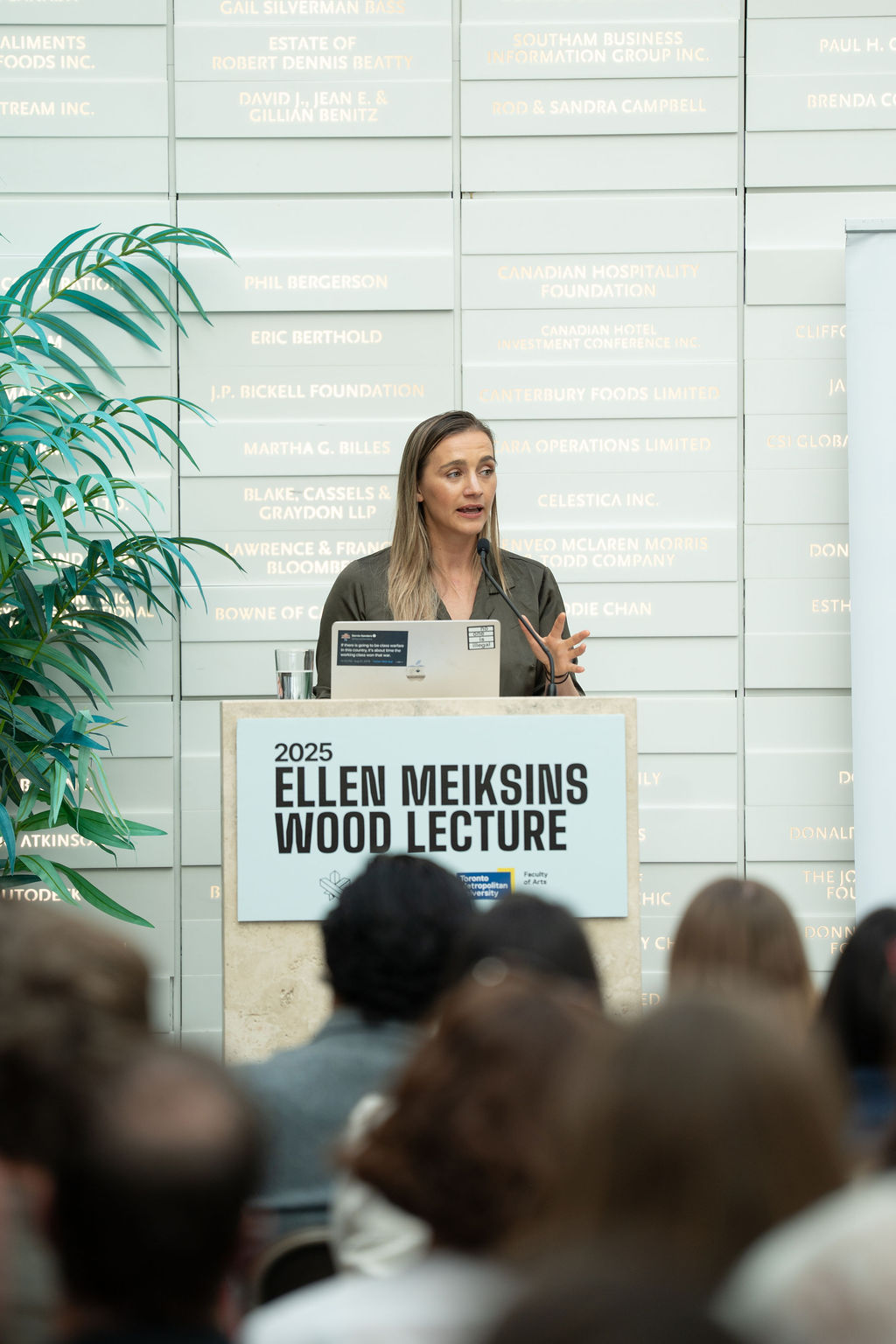
This issue of powerlessness, I would say, is the defining political emotion of our age, and the far right is beating us in the response. Why? There are two ways that you can respond to powerlessness. Different sides of the political spectrum take these different responses, respectively. There’s despair: “I’m powerless to change things. The world is the way it is. There’s nothing I can do about it.”
A lot of people on the left often end up taking this route. I see this extensively among young people today, particularly when it comes to how they take on the climate crisis. Ultimately, it can lead to conspiracism, because it is an inverted response to this feeling that those at the top are in complete control, “and there’s nothing I personally can do about it. There’s nothing I can really do to challenge them.”
The other way to respond to feelings of powerlessness is anger. People thrash and rage against the constraints imposed upon them, and desperately attempt to regain some sense of agency and power. Often, they regain this sense of political agency by projecting it onto a powerful ruler who promises to come in and bash the political elites who have crushed, ignored, and undermined them for so long.
Thinking about this response to powerlessness—this rage in response to powerlessness that the far right has capitalized on so effectively—I reflected on the emergence of fascism in Italy. The word comes from this tool that was developed by the Romans, the fasces, which is a bundle of sticks with an axe in the middle.
Mussolini picked up this symbolism. The reason that the fasces are used is because a single stick is very easy to break. But when you bind a bunch of sticks together, they become very difficult to break. When you stick an axe in the middle, they can be used to attack your political enemies. It’s not a coincidence that this bears some similarity to the historic symbol of the trade union movement: a raised fist. You can break one finger quite easily, but you can’t break a raised fist.
This is an important point to understand for the rise of fascism in the context of powerlessness, both today and historically. In an age when people recognize and realize the coordinated, pervasive power of our political economic elites, they feel isolated to do anything about it. They feel like that one stick or one finger. A message that says, “if you come together, you can be powerful,” is very compelling. The tragedy is that that message, which was historically put forward by the left as part of the labor movement, has been lost.
The right are doing that effectively. They’re saying, “you need to come together to defend your communities against outsiders.” Often there are overtones or undertones of political violence as a part of that. This is the main issue threatening democracy today. It’s not just inequality. It’s inequality in the context of the decline in collective power and the rise of individualism. This can again be traced back to neoliberalism—something ordinarily associated with changes in economic policy.
There was a profound and deep project at the heart of the neoliberal movement, and it comes through in the quote from Margaret Thatcher who says, “there’s no such thing as society.” This wasn’t an observation of the society that she found in the 1970s in Britain. That was a statement of intent.
One of the most important parts of the neoliberal revolution was breaking up the collective institutions that gave people that sense of community, power, and solidarity in an economy that was weighted against them. That allowed people to shift the balance of power within society, make politicians pay attention to them, and create those changes within the state in their favour.
This was Thatcher, taking on the miners. It was Reagan, taking on the aircraft traffic controllers. It was also globalization, leading to hollowed out places where there were once thriving communities that could allow people to engage in political projects. It was the centralization of state power, somewhat ironically, for a neoliberal movement that claimed to abhor the state. As I show in Vulture Capitalism, neoliberalism’s claimed abhorrence of the state is very far from the truth. Neoliberals created laws diminishing protest and striking against the state.
I think Ellen Meiksins Wood captured this really effectively: “For all intents and purposes, there is no politics, or at least no legitimate politics, outside of parliament. Indeed, the more inclusive ‘the people’ has become, the more the dominant political ideologies have insisted on depoliticizing the world outside parliament and delegitimizing extra-parliamentary politics.” This neoliberal attempt to eviscerate those collective institutions that gave people a sense of belonging, solidarity, and power, was a response to a very particular political moment.
There’s a French sociologist, Grégoire Chamayou, who wrote a book called The Ungovernable Society. He observed in the 1970s that, all across the rich world, there was this moment of extraordinary confidence among the working classes. This was obvious in the labour movement where UK workers came together to effectively shut down production in this struggle over who was going to be made to pay for inflation. But it was also visible throughout the whole of society—in the anti-apartheid movement, in the peace movement, and in the movements of 1968 across Europe. There was this sense that those at the top were losing control.

This sense is critical to understanding how capitalism works today. The neoliberals at the time had the narrative that capitalism is a free market system and that we need to reduce the size of the state to create more space for the market. But the way that they actually behaved had very little to do with creating free markets. If you look in the economic sphere, it has more to do with subsidizing vested interest to maintain control. In the realm of society, their project was to take down these forms of collective power and create an ideology of the market that encouraged us to believe that we all had to compete against one another to get to the top.
In Vulture Capitalism, I take down the neoliberal ideology that says we need to create free market systems by showing that most of their policy proposals did anything but. They actually ended up creating forms of corporate corruption and centralization that were antithetical to the original ideas of thinkers like Friedrich Hayek.
The ideology of the market became this belief that society should be made to resemble a market system in which you couldn’t have forms of collective organizing that would undermine its function, requiring us to be isolated, atomized individuals competing against one another to get to the top. If you do get to the top, it’s because you are a high-value individual. If you don’t get to the top, it’s because you are a low-value individual. Don’t blame the system, blame yourself.
This was an ideology that was pushed in a number of different ways. There was the obvious use of force that Margaret Thatcher used, sending the police against striking miners, but there were more subtle ways in which this ideology was pushed. For instance, we stopped referring to workers as workers. Instead, workers were understood as “mini entrepreneurs.” This was epitomized and reached its apogee with the rise of the gig economy, where a worker was no longer an employee of Uber, but was seen as a little firm that could buy its own inputs and outputs.
It was also evident in the neoliberalization of education in order to develop your individual human capital. For neoliberals, it’s okay for you to take out a loan to invest in your education because you are going to reap the long-term returns from that investment in your human capital over the long run.
You are not a worker, you are a small business. Everyone in that sense is drawn into the capitalist system because your fate as an entrepreneur is, in some sense, tied to the performance of financial markets. This is again epitomized by the creation of homeowning democracies and the privatization of pensions so that your fate, as a worker, is tied to the ups and downs of capital markets.
And you can be encouraged and convinced not to come together with other workers to demand increases in your wages, but instead to compete with those around you and to understand the performance of your portfolio as a representation of your effectiveness as a little entrepreneur.
Workers became entrepreneurs. Citizens were no longer understood as citizens participating in a public sphere. Instead, they came to be understood as consumers of public services. The median voter would attempt to maximize their utility by voting for the political party whose policy program most neatly represented their interests and preferences.
In this transformation you had the technocratization of politics and the loss of the sense of politics as a struggle between different interest groups. Instead, there was the rise of a form of politics that someone like Mark Carney really epitomizes; the idea that politics is a choice between different policies that can be assessed through the discipline of economics to determine which policy is the best. It also just so happens that the best policies assessed tend to be the ones that actually work in the interests of those at the top.
As Ellen Meiksins Wood would have argued: we need real democracy. I would argue: you cannot have real democracy in an individualistic society where, rather than collective power, people see themselves as competing with one another in order to get to the top of a rigged economy. The only way to change things is to shatter individualism as an ideology, practice, and set of structures, then figure out how we can work together again.
Citizens become consumers of public services. Communities lose their collective representation and instead become isolated households. A whole movement within neoliberal economics was built to say that failing communities should be allowed to fail, and those resources should be more effectively redistributed to allow for the proper, efficient functioning of markets across geographical places. While we lost thriving communities, which were the foundations of the labor movement in many places, neoliberals built isolated individual households that needed to learn to compete against one another to survive.
Today, we are so busy competing with each other that we have forgotten how to work together to change the rules. That is why we all feel so powerless. This represents a real challenge because it’s a shift away from how society looked when the left first emerged; workers coming together to form the first unions and fight for their right to organize and fight for democracy itself. They faced, objectively, far greater challenges than we do today, but they had a sense of their own ability to work together and change things. That’s what we lost in the 1980s.
So how can we fight back?
As Ellen Meiksins Wood would have argued: we need real democracy. I would argue: you cannot have real democracy in an individualistic society where, rather than collective power, people see themselves as competing with one another in order to get to the top of a rigged economy. The only way to change things is to shatter individualism as an ideology, practice, and set of structures, then figure out how we can work together again.
Stop asking, “what can I do?” and start asking, “what can we do?”
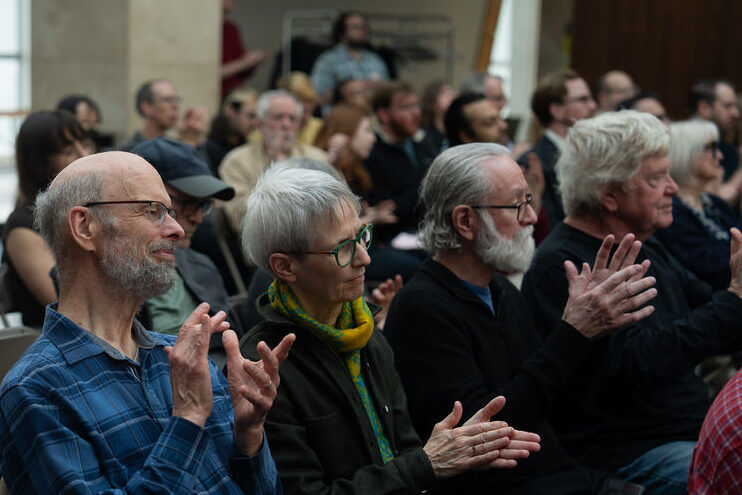
Our job on the left isn’t just to explain why capitalism isn’t working. I can give complex theoretical explanations of the links between public and private power under capitalism. But what I found when talking about this book with normal people is that most people already know this. They know that big businesses are in bed with the government. That’s what the guy was telling me on the doorstep all those years ago. They don’t need us to explain why.
The issue is that they feel powerless to change things. Why? Because you can’t change things on your own. That is how people feel completely on their own.
The reason that I started investigating these problems around individualism and isolation and powerlessness is because when I was going around promoting Vulture Capitalism, I spoke to a lot of young people and they would be really enthused by the ideas that I was talking about in the book. In particular, they were excited by the final section where I discuss several examples of democratic planning at the grassroots level.
Because their worldview is so shaped by individualism, the idea of coming together to build different ways of living to challenge the power of capital is so alien to them. They’re used to going to book talks about politics, and the end point is a list of policies that could be implemented or, even worse, a set of consumption decisions that you can make to be a good ethical consumer that isn’t directly contributing to the issues that we’ve talked about.
This challenge of individualism has become so rooted particularly in the minds of young people who’ve never really lived without it. It’s also why there is this profound sense of isolation. There are many young people, particularly the Gen Z who I’ve spoken to, who have begun to participate in forms of collective organizing that have brought them together with other like minded people, whether that’s as part of a union, whether it’s as part of a protest movement, a climate movement, or any collective action group. The one thing that they speak about, that they all have in common, is this sense of collective joy, and the fulfillment of this need for connection and belonging that they didn’t realize they had that is now met through participation in these social institutions. That’s why I think today the job of the left has to be to help us to rebuild those forms of collective power.
There was a time when these forms of collective organizing taking place at the grassroots were dismissed as “folk politics.” There was then this shift on the left to refocus on institutions, and I think that was important. It was right. It laid the foundations for what we saw in the 2010s, for the rise of leftist movements in which I was involved. But those institutionalist projects all failed because they didn’t have that base that could shift the balance of power in society to build power.
Instead of pushing some policy agenda that can be implemented by elites, we need to empower people to take control from the bottom up. Not because we don’t want to take control of political institutions, but precisely because we do.
If the Left wants to influence political institutions, we need to be able to understand this idea of the state as a social relation. This Marxist idea that can be traced back through someone like Ellen Meiksins Wood, but also to Ralph Miliband and Gramsci, and is needed to ask: how do we build popular power to allow people to take back control over their lives so that they can become engaged in these forms of politics?
This requires a shift in our own ways of thinking about politics, because there’s a sense that we have absorbed an individualistic approach to politics. I see this a lot in people on the left, seeing ourselves as heroes saving victims. I think this is what that man who I spoke to on the doorstep was really cynical about, because it feeds into a lack of agency. If you approach someone and say, “I’m here to save you,” that feeds into that very sense of powerlessness that is at the root of their political alienation to begin with.
This is the challenge that we face today. We need to abandon the politics of hero and victim, and start empowering working people to, in the words of the Brexiteers, “take back control” of their own lives.
If you think about it, this is the only way that the left has ever won political change in the past. Left politics did not emerge from clever leftist intellectuals, going to working-class communities and saying, “have you considered forming a union to shift the balance of power away from capital and towards labour?” No. Left politics emerged out of people’s struggles for a better life.
Instead of pushing some policy agenda that can be implemented by elites, we need to empower people to take control from the bottom up. Not because we don’t want to take control of political institutions, but precisely because we do. I think our understanding of our mission needs to change.
I’m entirely in favour of slogans like ‘Tax the Rich’ or ‘Green New Deal now,’ but how is someone who’s hearing that message going to respond? How do I engage with a political project whose mission is a set of policies that’s going to be implemented by elites?
Instead, I think we need to focus as well on empowering people to take control in their communities, in their workplaces, and on the streets. I think we need to be reminding people that political change isn’t something that is going to be delivered from the outside. That’s not how democracy, as people like Ellen Meiksins Wood understood it, works.
It’s going to come from their efforts to change their own lives. And our slogan, I think, has to change. It has to look something along the lines of “organize,” because nobody is coming to save us.
Thank you.

